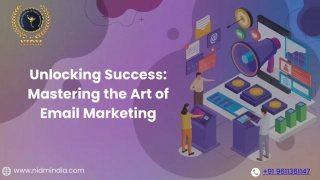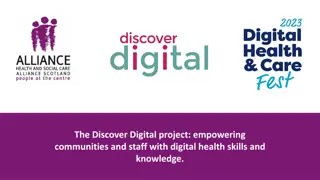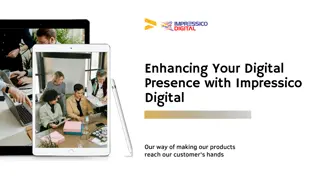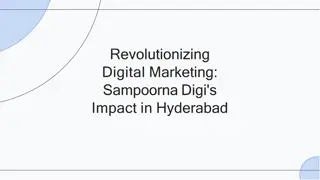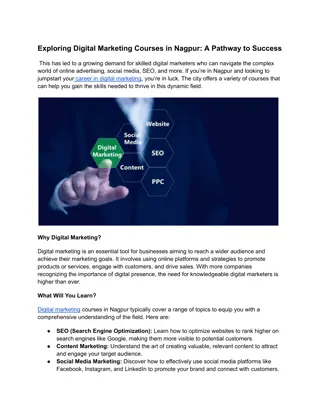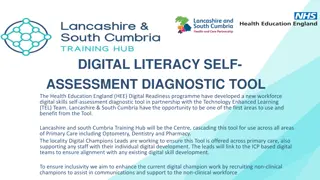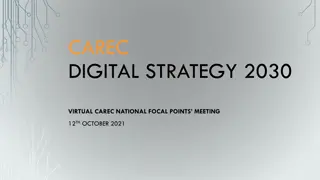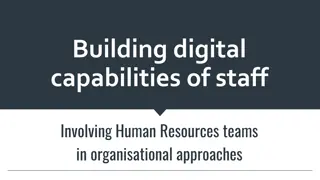National AHPs Deliver National Digital Framework
AHPs play a crucial role in advancing digital technology and data innovation in healthcare. The focus is on creating digitally ready AHP services, developing digitally mature practices, and supporting data-enabled services. Domains cover various aspects from general to meta-competencies. The AHP Digital Competency Framework emphasizes key areas such as decision support, digital therapeutics, medicines management, data management, and clinical informatics. The framework aligns with the organization's ambitions and engagement strategies.
Download Presentation

Please find below an Image/Link to download the presentation.
The content on the website is provided AS IS for your information and personal use only. It may not be sold, licensed, or shared on other websites without obtaining consent from the author.If you encounter any issues during the download, it is possible that the publisher has removed the file from their server.
You are allowed to download the files provided on this website for personal or commercial use, subject to the condition that they are used lawfully. All files are the property of their respective owners.
The content on the website is provided AS IS for your information and personal use only. It may not be sold, licensed, or shared on other websites without obtaining consent from the author.
E N D
Presentation Transcript
AHP Digital Katrina Kennedy Associate Director of AHP
National AHPs Deliver National Digital Framework Dorset Digital Strategy engagement and ambitions HIOW AHPs engagement Workshop AIMS
AHPs can further harness digital technology and innovate with data AHPs Deliver 1. Creating digitally ready AHP services: focusing on digital leadership, digitally ready AHPs and AHPs in clinical informatics addressing the use of digital capabilities, integration, interoperability and digitally - enabled AHP services 2. Developing digitally mature AHP services: calling on AHPs to ensure that the adoption of new technologies and processes, and the services data from these, leads to improvements 3. Supporting data - enabled AHP services
DOMAINS 1. General 2. Data management and clinical informatics 3. Records, assessments and plans 4. Transfer of care 5. Medicines management and optimization 6. Orders and results management 7. Assets and resource optimisation business 8. Decision support 9. Digital therapeutics 10. Meta-competencies AHPs National Framework
General Transfer of care Data Decision Support Digital therapeutics Medicines management & optimisation Meta- Assets & Resource optimisation Orders & Results management Records, Assessments & plans Management/Cli nical Informatics Competencies OPD Risks IG, cyber security & privavcy Organisation (PAS, Bed management systems, Business intelligence & support) Structured Vs unstructured data in EHR Data capture at point of care EHR system design and modification Automated evidence- based guidelines with systems Clinically assured health information Diagnostic screening/ monitoring Leadership Attitudes & beliefs E-prescription Strategy Data sharing Automated dispensing Interoperabilty Behaviours Remote care Path labs Vs Medical imaging QI & Research Data evaluation and analytics Associated AI/ML Foundational computer skills mHealth apps/devices Independent prescribing Change Management Personalised care Viewing, sharing & storing data Clinical Coding Risks and bias Other patient facing technologies PGDs/ PSDs Personal (ESR, HR systems, e- rostering) Governance Professional responsibility Associated AI/ML (supervised Vs unsupervised) EMOPs AHPs Digital Competency Framework
Dorset AHP Digital Strategy Review of Engagement Events
Event Summary Introduction Outline of Purpose Hilary Hall (Lead AHP ICS) Aligning the Dorset strategy to the National Digital Framework Jo Elliot (Clinical Head of Systems Processes) Explanation of Digital Strategy ambitions 4 Questions- Responses through chat bar and downloaded after for outputs. 2 Chat Bar observers- Pulling out key themes and feeding back after each question
Event 4 Event 3 Participants per event (47 Total) Event 2 Event 1 0 5 10 15 20 Participants
1. What prevents us from using the proven digital technology we already have? Awareness of the proven digital technologies; access to digital tech Patients ability to understand how to access and having the time to chat through with patients how to use (5) People access to wi-fi, users understanding (2) No tech road map (1) Some staff have a perception that patients won t want to use technology but this is a clinicians bias. Awareness Underestimating our clients competency to use it (1) Willingness Old I.T equipment (1) There is some avoidance by some pockets of clinicians (1) Time pressure to get an outcome, rather than an holistic outcome! (4) Patient ability to use it, does not always suit the purpose eg; group sessions/hands on assessments (2) Resources Equipment Lack of confidence / training for staff this is a new way of working often unfamiliar to clinicians. Plus tech use still emerging in older generations of the population we serve(2) Attitudes/Stigma Patient access to hardware/functioning computer (2) Laptop reliability, due for update but no timescale (2) This is a new way of working often unfamiliar to clinicians. Plus tech use still emerging in older generations of the population we serve(2) Not enough time to explore what is available (1) Lack of ability to use 1 system eg; System 1 (3) Training Multiple systems but not enough knowledge of each (1) Integrated systems Connectivity issues both at work and at home (2) Not enough tech savviness, learning off the hoof (1) Not enough awareness of resources/technology that are available (4) The availability of the technology and the failure of connections; patient's having the appropriate technology their end; difficulty with physical assessment remotely (2) Health and Dorset council on different systems (3) Connectivity
2. What are the behavioral changes we need to see across primary, community and Acute care to fully embed and optimize the technology/ digital innovation we already have in Dorset? Support for care and nursing homes to use technology, supporting patient expectation for it's use (2) Patient support / training to improve confidence (1) Improved collaboration, joint training , joint or improved access to computer systems (1) Building trust/good relationships with care providers (3) Working as a one team of health and social care we need access to just one system to record client/patient information and be able to access.(1) that it will improve patient care and not increase clinician burden Training Collaboration Better training and awareness of IT systems eg TEAMs (3) Trust/Relationships more opportunities for collaborative working (8) Senior population may not have access to technology or know how to use it.(1) Develop system of saving/organ ising info so can access when needed (3) Systems to talk to each other/avoid repetition (7) Integrated Systems Willingness to try different technologies- playing around (3) Supporting patients to access (2) Senior management support and buy in (2) Computer systems designed jointly that speak to each other and pull information across. Training collaboration (1) Not a second class service (2) Promotion/incentives to change Acceptance/Willingness Aligning systems used across all areas of acute and community (5) Promotion to the general public of digital assessment as the 'new normal' increased communication through media to explain why and how this is happening and the benefits (5) Staff accepting change in role and wanting to go back to all face to face when able (4) How this can benefit our practice, people need user examples for them to see and realise Lack of incentives to change (4)
3. What are the behavioral changes we need to see amongst our patients/service users/citizens to fully embed and optimize the technology/digital innovation we already have in Dorset? Just as a patient may have needed or wanted someone to be free to accompany them to a face to face, they might need to plan and expect that they may need someone to help them with a virtual appointment (6) Increased use of tech generally, particularly in the older age groups. We need better support for people to improve their IT literacy (3) Clear expectations of what they are getting from the service and system they are using rather than seeing it as 2nd best (3) User friendly digital services/ easy access (2) Security Promotion of digital solutions as an advantage and addition to care (pts often see it as 'second best ) (2) Acceptance/ Effectiveness Trust/Empowerment Confidence in the security and confidentiality of the systems (2) Taking more responsibility for own health (2) Understanding that the digital systems can be as effective or more so as Face to face (2) Advantage of digital solutions Willingness to be trust and learn technology (3) That clinicians can reach a "diagnosis" without touching them (5) That TM and tel appts are as precious and need to be kept - need to avoid DNAs for these appts (4) Understanding and acceptance of how virtual management can help and be willing to give it a try. (4) patients giving virtual appointments same level of attention and face to face - for example not a phone call whilst the are out shopping (5) Appreciate new normal of digital applications and appointments (1) Access to digital champions to help people with their digital journey (1) Quality of care Whereas, a lot of reassurance /advice can be completed digitally (2) Local digital champions Provide reassurance that it doesn't affect the quality of care received (3) Culture, different age related generations will always have an impact on willingness to utilise. Clients in particular that are acutly unwell or have disability cant and do not feel able to access. Complexity of systems. They want to speak to an individual person for help. (4) Appreciate benefits of virtual consultation and how they can be interactive (6) Support for those who struggle to access technology eg public access computers in a confidential space so they could use them for appointments (3)
Identifying enablers/resources and support in the community (2) Greater publicity in the media generally of how digital consultations and healthcare solutions can be effective and empowering (1) 4. How might we achieve this and go further and faster in our response? AHP Digital Champion Joint system with health and Adult social Care will enable easier access to client information and provide quicker and better care for clients/patients without duplication (3) Collaborative training with a 'technology champion' representing each area/service, then they can cascade down to rest of their team (5) Integrated Systems could share some quotes from some 'satisfied customers' TV/Publicity Embed use of tech at Uni level (3) support for patients/service users when setting up virtual consultations - central support centre for patients (2) Learning from early adopters (3) Joined up comms, easy read guidance, joint funding to deliver digital enabling interventions (2) Locally embedded AHP digital champions to support, promote, connect and communicate connected to a wider strategic forum (2) Offering core digital training (1) Use of libraries/day centres/community hubs to roll out training (3) education, education and more education! (1) Job role Training Resources Financial Need a whole Dorset strategy that includes all providers, need IG support and guidance from the beginning, Dorset needs investment into internet provision Include in job role for all new starters (4) Provision of some specialist equipment where deemed appropriat e for patients Training for staff on how best to manage patients in this way - ie assessment techniques and then how to get patients on board with management. Provide community access points for those not enabled (1) Be clear on virtual apt letter of expectations on both sides. Appraisal Financial investment in upgrading equipment and aligning systems (1) Start with the quick wins. Advertise the benefits and share good examples with customer messages. At referral points can intervention method be or preference be selected so that customers know its an option (5) Invest in IT equipment for staff and departments. One Joint system for social and health (3) Ensure covered in appraisals (1)
Dorset AHP DIGITAL STRATEGY Overview - 2020/21. General Overview of the purpose of the project including key deliverables and timeframes; Following the publication of the National AHP Digital Framework in 2019 and the explosion of Digital health during the Covid19 pandemic it was suggested that we should develop a Dorset AHP Digital strategy. We approached the Wessex AHSN who gave us the process to engage with AHP s across Dorset through four Team events. The outputs from the events have been used to develop a strategy, driver diagram and action plan The Dorset AHP DSG was established to provide oversight, guidance and a reporting structure for AHP s with regard to the Digital agenda across the Dorset ICS. We will promote good practice, disseminate learning and establish a system for all AHP s to be provided with the right tools to embrace digital technologies in their roles. The core focus of the group will be to develop and implement a strategy for AHPs across Dorset using the UK Allied Health Professions Digital Framework as guidance. Relevant National AHP Objective / Policies / Strategies that the project aligns with: Job planning, ESR and workforce productivity All AHP understand and access Digital health technology plans to support self-management. Local Digital Roadmaps and the use of the Digital Maturity Assessment The future of healthcare: our vision for digital, data and technology in health and care (2018). Dorset AHP Digital Overview AHP Lead
Dorset Digital Driver Diagram 2020/21. Secondary Drivers Primary Drivers Project Activities 20/21 Aim/Objectives Digital literacy AHP Clinical skills in coding AHP s can evidence digital; literacy in CPD. Link with HEI to ensure Digital skills are embedded in curriculum All AHP aware of Digital Health Technology plan Ambition 1: Digitally ready AHP services AHP s can access Dorset wide Academy for training Strategic Aim Raise awareness of Digital Fellowship opportunities Digital leadership To support the Dorset Digital plans and embed the National AHP Digital framework in all AHP services across Dorset by 2024 Increase number of AHP s in Digital careers Ensure Digital competencies are in the Dorset AHP Career framework AHP leaders enabled to use Model Hospital, ESR, EPR, NHS APP, ORCHA, Assistive technologies, Teams, life-size Knowledge exchange on digital health information available across the ICS Ambition 2: Digitally mature AHP services Increased use of Digital Care Record and myDCR Effective integration and interoperability Enable population health data to be shared and used by Dorset AHP s Advanced data analytics and population Health management AHP improvement projects include Digital capabilities compliant National standards Standardise outcome measures across Dorset AHP s Ambition 3 : Data enabled AHP services Encourage KPI s and outcome measures to reduce unwarranted variation AHPs look at digital solutions for outcome measures Service reviews include digital and virtual, use of qualitative feedback AHP s will use digital technologies to promote both staff and patient experience AHP leaders enabled to collate Clinical Hours to Contact Times data to be used for business cases Resource sustainability data supports capacity & demand workforce model
HIOW Allied Health Professions Digital network Priorities for 2021/22
Introductions Share local Digital initiatives, learn from each other Share/discuss national AHP Digital resources/developments HIOW strategy? HIOW AHP DIGITAL Network
VISION Understanding what digital literacy is so that all staff can contribute Digital therapeutics and decision support System wide access to links for NHS evidence for al clinicians Advanced Practice Assets and resource optimisation Improved accuracy TASK 1 HIOW - AHP DIGITAL Leadership Strategy OBJECTIVES Widely available digital literacy training Digital leadership placement Develop a system for recording CPD Integrated IT platforms with shared access Business intelligence Apps for self management Weekly data to track progress Single point of access Meta competencies Cyber security GDPR
CHANGES Access to patient information Reduce duplication Integrated health and social care Duplication Mobile working Availability for clinical outcomes to be online Task 2 HIOW AHP electronic documentation BENEFITS Times scale reporting separate training systems Parity between systems Wider population engagement EQUIPMENT Lap top versus App More reliable network Resources Ability to upload audio visual and images Docking stations work space Value in doing things versus time
General Transfer of care Data Decision Support Digital therapeutics Medicines management & optimisation Meta- Assets & Resource optimisation Orders & Results management Records, Assessments & plans Management/Cli nical Informatics Competencies OPD Risks IG, cyber security & privavcy Organisation (PAS, Bed management systems, Business intelligence & support) Structured Vs unstructured data in EHR Data capture at point of care EHR system design and modification Automated evidence- based guidelines with systems Clinically assured health information Diagnostic screening/ monitoring Leadership Attitudes & beliefs E-prescription Strategy Data sharing Automated dispensing Interoperabilty Behaviours Remote care Path labs Vs Medical imaging QI & Research Data evaluation and analytics Associated AI/ML Foundational computer skills mHealth apps/devices Independent prescribing Change Management Personalised care Viewing, sharing & storing data Clinical Coding Risks and bias Other patient facing technologies PGDs/ PSDs Personal (ESR, HR systems, e- rostering) Governance Professional responsibility Associated AI/ML (supervised Vs unsupervised) EMOPs AHPs Digital Competency Framework
DIGITAL TASK 1 2 3 Examine the domains of the framework as a group. Prioritise which domains would be the central focus on your local AHP digital strategy. Pull together your short-term vision and your objectives.



